Beth Kephart's Blog, page 176
July 8, 2012
three things loved, three things hated: Kate Northrop's haunted poetry
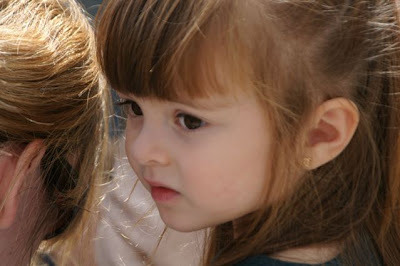
Out in Wyoming, where Alyson Hagy lives and teaches and writes, there are many very real, very committed artists. One is named Kate Northrop, a poet with whom I have enjoyed a correspondence.
Her poems have been called "haunted." They have been likened to "the penumbra in painting, where light and shade blend." They have been described as "inclusive and generous, yet the tension, the thrill, never slackens." Kate herself has been hailed as a poet with a "remarkable ability to combine erudition and empathy." Last year she sent me an early copy of what would become the Persea publication Clean. I read it in a sustained state of awe.
Today, thinking of Kate, I returned to Clean—the manuscript she'd sent—and found this page, these words. I'm teaching this week at the Philadelphia Museum of Art. I'm taking Kate's words with me.
The first day they had to name
Three things they loved, three
They hated
Loved: pulling moss from the seams
Between bricks; a stone
Cracked open; Jello, when you touch it
With a spoon, how it resists
Hated: a too-visible part
On the girl in front of you, scalp;
The skin formed on house paint;
Feet; white condiments
(Miracle whip, tartar sauce, mayonnaise)




Published on July 08, 2012 18:36
from the writerly life to the reviewing life
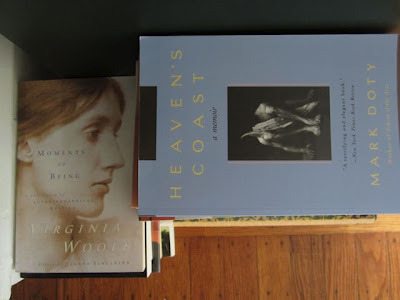
There's a funny thing that happens when you stop writing your own books—when you cool the fever, when you walk the garden, when you do not rise at 3 AM, determined. Other people's books become your obsession. Their stories, their words, their worlds. You grow responsible for understanding. You yield your empathy, devote your time. The days are long and hot and languid, and New Orleans wafts by courtesy of Ruta Sepetys, and Haiti, thanks to Edwidge Danticat, and the humor of Haven Kimmel, the confessions of Caroline Knapp, the daughter of a salt god (Ilie Ruby), Cambodia at war (Vaddey Ratner), the very secret life of objects (Dawn Raffel).
Over the course of the last month, I have bought nearly 100 books and others, due out soon, have made their way to me, courtesy of publishing houses and authors. My triple-stacked shelves in every book-devoted room are officially overtaxed. Book piles approximate architecture. Most women get up and ask, What will I wear? I wonder, upon rising, what to read.
My mind is clear; it is at peace; it is satiated. I sleep better than I did. I want less. I am comforted by books, comfortable around them, and the words I do write these days are reviews and essays, opinion pieces, suggestions. Short pieces, perhaps 1,000 words a day, that help me put into context those things that I'm learning about language and how it works for others.
It seems enough, for summer.




Published on July 08, 2012 05:23
July 7, 2012
Out of the Easy/Ruta Sepetys
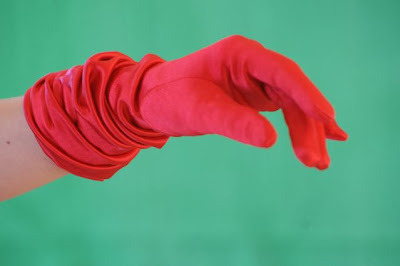
The dignity of Ruta Sepetys is telegraphed from afar. It's in the books she writes—the international sensation Between Shades of Gray and now (coming in February 2013) Out of the Easy. It's plain as day in her interviews, her commentary, her web site, her broadcast segments. And if you ever have the chance to meet her (and I'm lucky; I briefly have), it's all right there in her face. Ruta isn't a writer simply and only because she wants to be a writer. She's a writer because she has something to say.
She's a writer, too, who knows the value of deep research—the liberating and liberalizing ways that rooting around in both personal and world history, in the files of the Soviet secret police and the murky streets of the historic French Quarter, in old maps and and the catalogs of Smith College, in the workings of all kinds of watches will, when pondered long enough, when tacked and quilted, generate story. Research, particularly historic research, can be hard to master and harder to contain. Ruta makes it look easy. What she knows never trumps the many things that she imagines.
I spent today lying in a steamy east-coast house, circa 2012, reading Ruta's delectable new circa 1950s New Orleans novel. Often I forgot just where I actually was as I slid into the dream, drifted in and out of the old bookstore (and the chatter, always smart, about books), had a good old walkabout in the brothel (equal parts gaudy and opulent), and fell in with Easy's seventeen-year-old heroine, Josie. Josie has found her way despite her mother's poor profession, witless selfishness, and fancy for bad men. She's a spitfire, an I'll-do-it-myself-er, a girl walking around with a pile of lies but without a dent in her actual morality. She's the favorite of the wily, big-hearted madam known as Willie. She's loved by two boys—Patrick, her co-worker at the bookstore, and Jesse, a beautiful boy with a mysterious past—not to mention a whole lot of poor souls who make her tattered life rich. Josie's mother's on the lam and Josie's in trouble, and there will be murder, mayhem, lies, sacrifice, and choices before this story is through. There'll be a whole lot of color and New Orleans twang, a rip-roaring cast, and, always, Ruta's intelligent sense of humor, not to mention instructions from Dickens.
Easy, which is a Tamra Tuller book, which is to say a Philomel book, which is to say the product of a remarkable book family headed by Michael Green, sounds spectacularly like then (the details are so right, their webbing-in so clever), but it resonates for now. It's going to generate a whole lot of book love when it debuts next winter.




Published on July 07, 2012 16:22
that book trailer thing (as dissected by Tribune writer Nina Metz)
Readers of this blog know how tormented I've been about the whole book trailer thing. Do trailers matter? Should I indulge? Do I have a trailer state of mind?
Well, you know what I mean. For my home-made, no-budget Small Damages trailer, I decided to go with quiet. With photographs I took throughout my travels in Spain, with a hand-strummed guitar riff that my husband recorded out in his old garage, and with a few words from early readers. I knew I couldn't approximate Hollywood glam. It seemed wrong to try. And besides, Small Damages is a story of discovery, not just of self, but of place. There are few places more beautiful, to me, than my characters' southern Spain.
Lately, Nina Metz has been pondering the trailer topic, too. She writes of it with great humor and pizzazz in this Chicago Tribune story. Anyone contemplating the making of a trailer should take a look—not just for what Metz herself has to say, but for what her cast of interviewees contributes. Among them is the very smart Nick Davis (who is married to the tremendously talented Jane Mendelsohn, the author of one of my favorite books, American Music ).
And if you are in the it's-a-very-hot-day-and-I-can't-concentrate-on-words frame of mind, do yourself the favor of combing the story for its links to effective "trailers," particularly the extravagantly preposterous faux effort by Gary Shteyngart. It had me snorting with laughter.




Published on July 07, 2012 06:35
having your own voice
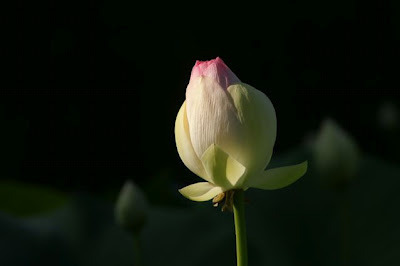
The writer's voice is honed over time. The rhythms, the point of view, the breaks between things, the bridging. It emerges from genuine passions and genuine fears, not borrowed ones. It is emboldened by the thoughts the writer actually has, as opposed to the ones he feels he should have.
Its authenticity is its greatest power.
It changes over time, and with the seasons.




Published on July 07, 2012 04:38
July 6, 2012
Let's talk about the label-ization of books (and Kristin Cashore)
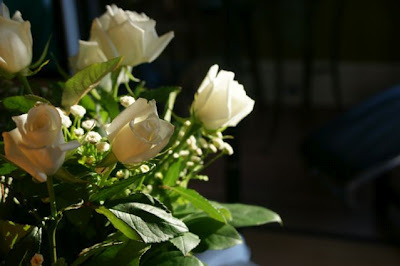
The other day I pondered my own capabilities as an interviewee and concluded that I still need a bit of work.
A lot of work? Yes, indeed. A lot of work.
In this New York Times By the Book interview, Kristin Cashore, author of the esteemed Graceling (which I read and loved) and Fire (and, now, Bitterblue) shows us how a real interviewee chooses words rightly. For Cashore's unwillingness to cop to easy answers or generalizations, for her range of knowing and wisdom, I respect the whole conversation. I especially respect Cashore's response to the question, What makes a great young adult book — as opposed to a great book for full-fledged adults? Her answer:
The fact that at the moment the distinction is being made, a young
adult, as opposed to an adult, is the one reading it. In other words, I
don’t entirely believe in the distinction. A great book is a great book,
and it’s impossible to say what part of a person is going to connect to
it. Age and experience aren’t always among the most relevant factors.
Perhaps I celebrate this response because I hold this opinion this myself—and have often tried to express it, with varying degrees of eloquence, in interviews and on panels. Just as I have fretted over the labeling of individuals, the attaching of classifications or lower-case nouns (oh, he's a manic depressive, oh, she's a workaholic), I do not cotton to the label-ization of books, to distinctions between young adult books and adult books, say, or to the assignment of fixed and self-limiting categories.
What adult, for example, should not read Thanhha Lai's Inside Out & Back Again, and what teen should not read the never-officially-stamped-or-stickered To Kill a Mockingbird? Why should the first thing one is told about Julianna Baggot's Pure be that it is a dystopian novel, as opposed to an intelligent and artful and imaginative novel? Shouldn't the readership of Vaddey Ratner's astonishing, forthcoming "adult" novel about a child growing up in the Cambodian killing fields, In the Shadow of the Banyan, be both teens and adults? Doesn't Ilie Ruby's forthcoming The Salt God's Daughter have much to offer any age, and can't we talk about its gentle mysticism, its magic as poetry as opposed to brand or tag?
Certainly, I know how hard this would make things for booksellers and librarians. I know that commerce requires labels, depends on it. But wouldn't it be lovely if readers talking to readers dropped the labels and distinctions? If we said, among ourselves, You must read this book because it is, quite simply, a great book, and because it will transport you.




Published on July 06, 2012 04:53
July 5, 2012
Central Park: An Anthology, A Poem, A Hot Day's Celebration
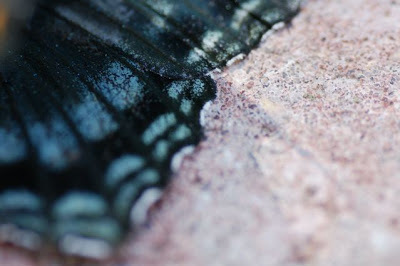
At the close of a warm day I discover this news in The New York Times—Andrew Blauner has edited an anthology on Central Park (called Central Park: An Anthology) featuring reflections and celebrations from Colson Whitehead, Paul Auster, Jonathan Safran Foer, Susan Cheever, Mark Helprin...and my friends Brooks Hansen and Buzz Bissinger, among others. You can read the whole Michiko Kakutani review here, but if you have time for just three paragraphs, I share these, about and from the Bissinger essay:
In Buzz Bissinger’s case, the view from his childhood apartment on
Central Park West provided a window on a changing New York City. Just as
he loved the boyhood ritual of going to the park with his parents on
Sundays, so he later loved the ritual of sitting with his dad in front
of the living room window overlooking the park.
Mr. Bissinger’s father died in 2001, his mother four months later, and
when the rent zoomed from $2,700 a month to $7,000 to $10,000, he and
his sister were forced to let go of their treasured home. Looking back
now, he says he realized he never felt closer to his family than when
they were sitting in the living room, looking out the picture window at
the panorama of those 843 acres below.
“I thought we would last forever,” he writes. “In a way I cannot quite
explain, I felt a sense of immortality because Central Park was
immortal, that everything would always stay the same.”
Reading all this takes me back to a Central Park day I shared with my friend Rahna Reiko Rizzuto. In celebration of the book, then, in celebration of Andrew, Buzz, Brooks, and Reiko, and in celebration of warm summer days, I share (again) that poem here.
Unassailable
From where we stood, on the castle rock
Of Central Park, Harlem was as near as
Twenty years ago. Everything
Between then and us was green.
The pond turtles were stacked up like stones
On stones. The trees were a day away
From shucking their own shells.
The red wing of a black bird was like a hand
That had been dealt, and we were the splendor
Sight we had given ourselves.
Afterward, it was Amsterdam to Broadway,
Columbus Circle down to the sweet
Remembered squalor of Times Square,
And on every corner: Song.
The high hollows of the Peruvians,
The mesquite of a jazz trombone,
The Mennonites in hairnets and black sneakers.
I wondered later whether we had become
The engine of concatenation,
Two women made radical
With unappeasable want,
The unassailable desire to remember.




Published on July 05, 2012 14:59
Nothing more than this today
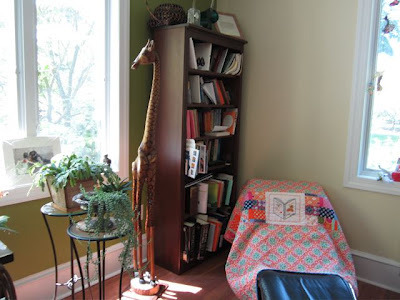
In the heat of this day, this room remains alive and deeply technicolor.
I have Wendy Robards to thank for that.




Published on July 05, 2012 09:15
July 4, 2012
Given a choice, would you choose controversy?

I may be a writer, a memoirist, a blogger, even, but I'm not keen on the spotlight. I feel more whole writing about other people's books, other people's victories, other people's big moments, than I do writing about my own. (How not to sound smug? How to make it clear just how grateful I genuinely am? How to telegraph what is always true, that I recognize the transient nature not just of glory, but of life itself?)
But sometimes I'm interviewed, and sometimes I'm asked to observe, to comment on trends, to make predictions. I love those conversations, but I don't love me afterward. I worry that I have unduly generalized. I worry that I haven't been clear. I worry that, in a small clip of a long interview, I may sound unlike myself who, in conversational real life, spills out into tangents, identifies the exceptions to the rules, and broadcasts not just tolerance but curiosity. I worry about inadvertently spiking a topic with a dash of Beth controversy. I don't wear controversy well.
Let me state for the record, in case I goof, in case I become unclear. There is never a single best kind of book, a single best category, a single perfect specimen. In every genre and every sub-sub-genre, arfulness can and does exist. Do I wish that sentences—their quality, their shape—mattered more than they sometimes do? Yes, I do. Do I wish that millions of people were reading something other than Fifty Shades of Grey? Yes. Honestly. I do. Do I wish that I saw more people reading unexpected books on the train, on the subway, at the beach, that a greater variety of authors found their audiences, that fads didn't always rule? I wish that, too. Beyond that, however, I celebrate this fact: good, even great writers are at work in every genre.
The interviewee version of myself is still a work in progress.




Published on July 04, 2012 07:57
July 3, 2012
A New Poem, Flying Chickadee, and the Courageous Creativity Zine
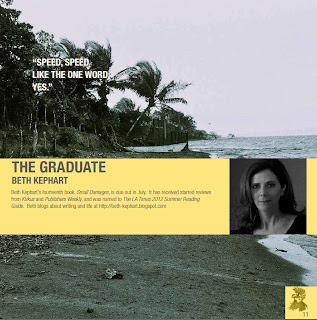
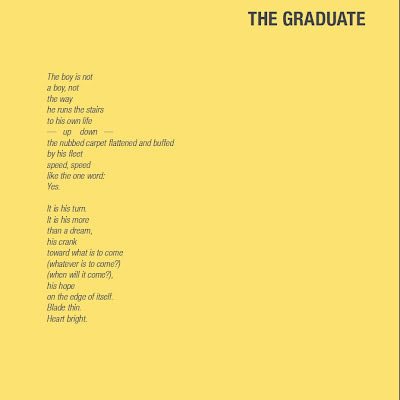
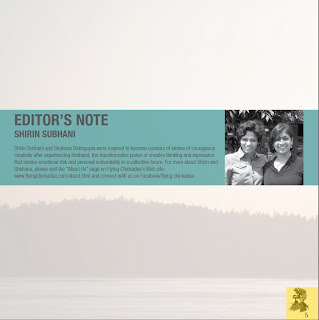
A few months ago, Lorie Ann Grover, a dear friend, talented writer, and founding partner in Readergirlz, introduced me, via email, to Shirin Subhani, the co-creator of Flying Chickadee and the quite original and lovely zine, Courageous Creativity. Shirin was wondering if I might write a poem on courage for her next issue, and I, thinking about my son's graduation and the uncertain nature of life ahead, said yes.
Within the last few days, this new issue of the magazine has launched, and it is, as I hope you'll see by going to this site, big in both heart and execution. Important stories are here, and so is hope.
Introducing, then, Courageous Creativity, and a poem about a certain boy, called "The Graduate." With thanks to Lorie Ann and Shirin.




Published on July 03, 2012 06:24



